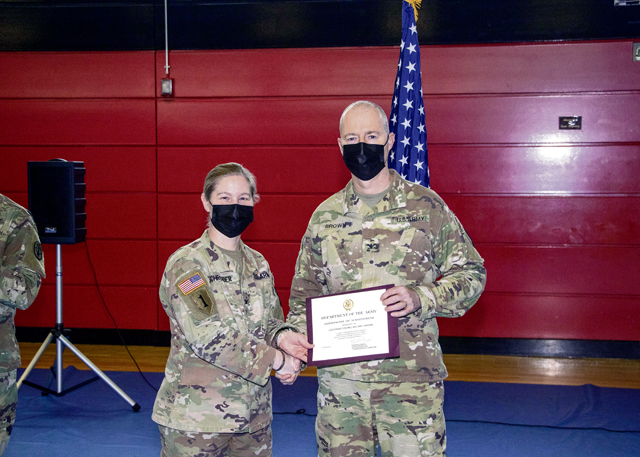Army Col. William Brown, chief for the Center for Nursing Science and Clinical Inquiry at Landstuhl Regional Medical Center, Landstuhl, was recently awarded the Army Medical Department’s 9A Proficiency Designator in recognition of his contributions to Army Medicine as a Nurse Practitioner.

The 9A designator is presented to select individuals who have demonstrated exceptional professional ability in the advancement of their specialty and is only awarded by the Army Surgeon General. To put into perspective, Brown is one of only 52 active duty Army nurses out of more than 3,000 to hold this designation.
More than a certificate of achievement or decoration to hang on a wall, the designation labels Brown as a national expert in his field, affording him the opportunity to become an associate professor at a college or a university.
Although the designator is the pinnacle of expertise for Army medical professionals, Brown doesn’t plan for greener pastures anytime soon.
“The one thing that’s cool about being a nurse scientist is you get to ask questions,” said Brown, whose passion includes mentoring junior officers and encouraging research to help field the next generation of problem solvers.
Army Maj. Albert Knight, a perioperative clinical nurse specialist at LRMC, recently coauthored a peer-reviewed article at LRMC during Operation Allies Refuge and Operation Allies Welcome. “(Brown) leads by example and is always ready and available to assist me with reviewing evidence-based practice, while at the same time offering expert practice recommendations from a distinguished nurse scientist perspective.”
In a testament to his scientific contributions to the field, Brown was also recently recognized as a Fellow by the American Association for Nurse Practitioners. The title recognizes nurse practitioners “who have made outstanding contributions to health care through clinical practice, research, education or policy” according to the AANP website.
After leading LRMC’s CNSCI section for years, Brown secured several grants and authored numerous scientific peer-reviewed papers in his quest for evidence-based best practices. His curiosity and grant-funded studies have directly impacted patient care across the medical community.
“If you have that curious, inquisitive mind, then research is perfect for you because it allows you to come up with a plan to potentially answer a why, which is profoundly gratifying and hopefully helps others in the process,” Brown said.
Army Lt. Col. Christopher Stucky, deputy chief of CNSCI and fellow 9A designator, says “(Brown) has mentored me and numerous others on scholarly writing, publishing, and research. It is great to partner with such an experienced and accomplished leader, and scientist.” Stucky has previously served with Brown and regards him as a natural mentor to others and strategic thinker in the research community.
Currently, Brown is the site principle investigator working on a multimillion dollar grant exploring the impact of yeast infection detection test kits which will give women control over their own health in austere environments.
When asked what he would like to tell the younger generation of Army nurses Brown says, “Most people don’t know, LRMC is one of five research cells in the Army Nurse Corps or CSI Centers for Nursing Science and most people in the Army don’t even know we exist, particularly junior officers. If you want to provide the best care, you have to provide the best evidence; to get the best evidence, you have to keep doing research.”







